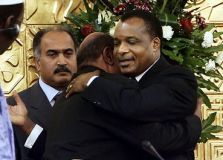Africa survives test of diplomacy
Jan 24, 2006 (KHARTOUM) — The African Union survived the toughest diplomatic test of its four-year existence Tuesday by settling a leadership row that dominated the Khartoum summit but left many of the continent’s problems by the wayside.
 The decision by African leaders to hand the presidency of the 53-nation body to the Congo Republic this year and to Sudan in 2007 capped days of wrangling that had threatened to damage the credibility of the Union and cripple its ambitious agenda for peace and development.
The decision by African leaders to hand the presidency of the 53-nation body to the Congo Republic this year and to Sudan in 2007 capped days of wrangling that had threatened to damage the credibility of the Union and cripple its ambitious agenda for peace and development.
Sudan’s bid to take the helm divided the heads of state because of the war in its western region of Darfur, where the AU is mediating peace talks and has deployed a 7,000-strong peacekeeping force.
Neighboring Chad last month declared a “state of belligerence” with Sudan following a border attack, raising tensions in relations already strained by claims and counter-claims of support for rebels.
“We believed that there are many problems to solve in Sudan,” said Burkina Faso President Blaise Compaore, a member of a seven-nation committee set up at the outset of the AU’s sixth summit in Khartoum to resolve the leadership row.
“But in 2007, Sudan will be able to take the presidency. We hope in the meantime to help it assume its responsibilities in the resolution of the crises in Sudan,” he told reporters.
The AU is eager to show the world it has come a long way since the “dictators’ club” of its predecessor, the Organisation of African Unity, which was headed by Ugandan dictator Idi Amin in 1975 and later Ethiopian leader Mengistu Haile Mariam.
When it was consigned to the dustbin of history in 2002, the OAU had acquired a reputation during its nearly four decades of existence for being nothing more than a “talking shop” of kleptocrats cut off from the hardships of their people.
The leaders also decided against extraditing Chad’s former dictator Hissene Habre to Belgium to face trial for crimes against humanity, said President Abdoulaye Waye of Senegal, where Habre took exile and was arrested in November.
“I will not allow Hissene Habre to be tried elsewhere other than Africa,” Wade told reporters after asking the union to decide the ex-president’s fate when Senegalese courts ruled that they had no jurisdiction in the case.
A commission of legal experts will be established to examine the case and the fate of Habre, who is wanted in Belgium under international jurisdiction, will be discussed again at the next AU summit scheduled to be held in July in Gambia.
Her Africap peers warmly welcomed Liberia’s President Ellen Johnson Sirleaf, Africa’s first elected woman president, now at the helm of a country torn by 14 years of civil war, and observed a minute of silence for Sudanese rebel leader John Garang, who died in a helicopter crash some seven months after signing the peace accord.
“The governments appreciate the importance of the African Union and the need for Africa to have a credible leadership to present its case,” said Reed Brody, spokesman for US-based Human Rights Watch.
African leaders were visibly relieved a solution was found to the leadership row, mindful that AU unity was at stake after Sudan won strong backing from Egypt and Libya.
“The most important thing was to reach a positive conclusion and that has been done,” said Somalia’s Foreign Minister Abdullahi Sheikh Ismail.
Watching from the sidelines, western diplomats and aid officials lamented that the summit had been “hijacked” by the leadership dispute while vital peace and security issues were brushed aside.
“The situation in Darfur is as bad as it was this time last year. Access to assistance is being denied,” said one aid official, who asked not to be named. “The AU needs to respond accordingly.”
Very little was said about the conflict in Ivory Coast or Somalia among the other dozen hotspots across the continent.
As the leadership row raged on, the UN food agency issued a statement announcing that some 43 million Africans would be in need of food aid this year, requiring two billion dollars in assistance.
In the Democratic Republic of Congo, eight UN peacekeepers were killed on Monday in a shootout with suspected Ugandan rebels.
(ST)
